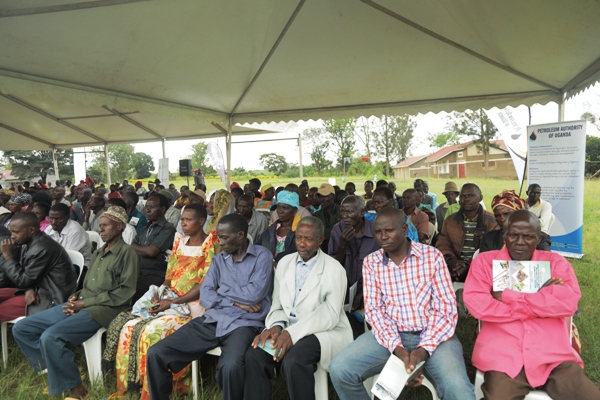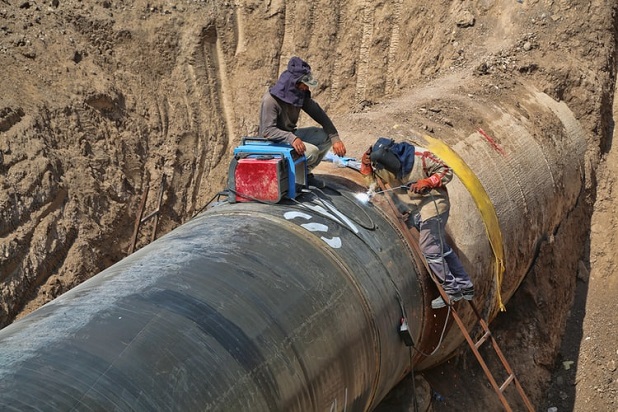Religious leaders led by Rev Borald Matovu (C) umbrella their body GreenFaith address journalists at Kampala Forest Cottages.
A section of religious leaders have written to President Yoweri Kaguta Museveni to intervene against ills inflicted against residents in the Bunyoro sub-region by the ongoing East African Crude Oil Pipeline – EACOP project works.
In an open letter dated February 16, 2023, the leaders under the umbrella GreenFaith; a grassroots, multi-faith movement against climate injustices decried what they described as staggering suffering of the communities.
While addressing journalists in Kampala on Thursday, the faith leaders drew the attention of the President that while some of the project-affected persons – PAPs have received compensation for their land, crops and graves lost to EACOP works, the money has certainly become a curse.
Led by Rev. Borald Matovu, the Mawogola Community Development Initiative Team Leader, the clerics are concerned that some of the men receiving compensation do not have the requisite financial literacy and have consequently used the money to marry new wives. He adds that the oil project has planted bitterness in the hearts of families that have not yet been compensated while others were tricked to accept inadequate compensation due to corruption causing a lot of negative sentiments.
While the government recently approved the application by the EACOP Company Limited for a license for the construction of the Pipeline, the clerics implored the President that there is no assurance to the communities of their safety and security in case of fire perils and toxic contamination from the oil spills.
James Mugisa, an aggrieved resident of Buliisa District decried unfairness in land compensation. His land was assessed in 2017 and when he declined to accept the 3.5 million Shillings compensation for an acre of land instead, he was evicted and the government deposited the money at Masindi High Court.
Comfort Aganyira, a Youth from the Hoima urged the President to ensure proper compensation for families that lost land and crops lost the EACOP project as well as comprehensive tree planting initiatives to recover the lost forest cover along the pipeline areas.
The clerics also cited that water from the Central Processing Facility in the Tilenga oil well has caused numerous floods and destroyed the crops and livelihoods of the surrounding community yet, no one has listened to the cries of the affected despite the risks.
They have implored President Museveni to draw lessons from the effects of oil drilling on the people of Niger Delta, South Sudan, Angola and Sudan and make informed decisions that would not adversely affect the population.
Furthermore, the aggrieved religious leaders pointed out that from the onset, EACOP, Kingfisher and Tilenga oil well projects ‘have not been for the people’ because the affected persons were not comprehensively involved in the project’s Environmental Impact Assessment.
Uganda discovered commercially viable oil deposits in the Albertine Graben region in 2006 and has since embarked on establishing effective management procedures to promote growth and development for the country. The country is expected to commence commercial pumping of the oil reserves in April 2025.In January, Cabinet approved the application by the East African Crude Oil Pipeline Company Limited for a license for the construction of the 296 km long Pipeline which is expected to displace at least 118, 348 persons (56,460 in Uganda and 61,889 in Tanzania).
The 1,443 km pipeline construction that will run from Hoima district to the Chongoleani Peninsula near Tanga Port in Tanzania will consume about 2,740 acres of land. According to Eng. Herbert Magezi Mugizi, Principal Engineer in the Ministry of Energy and Mineral Development, challenges relating to land acquisition due to contestations of valuations by the project-affected persons – PAPs still remain contentious.
The crude oil project which is worth 13.248 trillion Shillings (USD 3.6 million) traverses 171 villages across 10 districts of Kabaale, Hoima, Kikuube, Kakumiro, Kyankwanzi, Mubende, Ggomba, Ssembabule, Lwengo, Rakai and Kyotera.
The East African Crude Oil Pipeline Company Limited has a shareholding of 62 per cent from Total Energies while 15 per cent will come from the host Government of Uganda through the National Oil Company. Equally, the Government of the United Republic of Tanzania owns 15 per cent shares through the Tanzania Petroleum Development Corporation – TPDC, and 8 per cent shares for China National Offshore Oil Company – CNOOC Uganda Ltd.
On September 15, 2022, the European Parliament passed a controversial “emergency resolution” by a large majority denouncing the consequences of Uganda’s oil projects, specifically Tilenga and the East African Crude Oil Pipeline.
The resolution called for the immediate suspension of drilling activities in the protected and sensitive ecosystem (Murchison Falls National Park) and the postponement of the EACOP project for at least one year to allow a feasibility study of an alternative path to preserve the environment.
But two months later on November 2, 2022, the resolution was overturned during the Joint Parliamentary Assembly of the African, Caribbean, Pacific – European Union (ACP-EU) sitting in Maputo, Mozambique after the Assembly voted to let Uganda proceed with developing the Pipeline.
-URN





